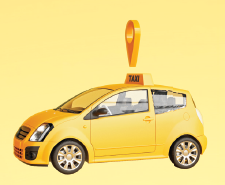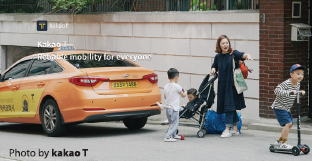Fill Up That Back Seat!
Yan Natalya, Editor

“When you ride ALONE, you ride with Hitler!” stateda poster used to promote carpooling in the U.S. as a way to ration gasoline during World War II. Carpooling is still a pressing issue today, though for different reasons. A year ago, Kakao Taxi, a taxi-calling service app, released a plan to make carpool a legal function for every taxi rider in Korea. But something went wrong. Regular smartphone owners and reasonable taxi users don’t see a problem with this idea atthe first sight. However, the problem with carpooling has turned into a serious social issue concerning everyone from those who call a taxi with an application and share the cab to those working in thetaxi industry.

Fire Incidents to Prove the Point
The carpool business model for taxi services was introduced to the world around 5 years ago by UberPOOL, a carpooling service of transportation network company Uber, which soon became a beloved feature. Carpool itself means sharing a car with other people going inthe same direction. It is popular mostly for economic reasons nowadays though it was widely promoted for overcoming the oil crisis as in 1970s in the US. Another US originated ridesharing company Lyft’s politics is to encourage breaking the ice with the drivers and make a friendly atmosphere in comparison to the‘less communication with passengers’ suggestion for Uber drivers. I the warmest of atmospheres a carpool passenger would experience. Back at 2015, the Kakao Taxi application was released and knocked out the main competitor, Uber. Local legal issues did not let the ‘everyone can be a driver’ model work, giving certified driverstheright to perform commercial rides exclusively. Now the strive for innovation is making Kakao keep insisting on their taxi share app having a right to exist. Kakao Mobility proposed a ride-hailing model wouldbenefit drivers’ by limiting the number of shared rides a driver cmake a day. But even twice a day without time restrictions turned out to be too much to put up with on a regular basis. Taxi drivers’ protests reached theirpeak twice during 2018, ending up with separate incidents of self-immolation. Two taxi drivers set themselves on fire within two months to protect the community. The carpool project will let regularcitizens pay less, while drivers are sure it will eventually reduce their income and create a livelihood crisis. The Realmeter, a local research and marketing organization, has recently conducted a survey of about 500 South Koreans. It shows about 60 percent of respondents support the car-sharing service. Thus, ridesharing projects are dealing with the moral decision to support innovation in the industry and make a little step towards a healthier environment or to prevent families of the industry workers suffering from further economic instability.

Sharing the Problem Worldwide
It is worth noting that Korea is not the only country having trouble adjusting to ride-hailing services. Spani drivers stopped working for eight days, demanding stricter regulations onUber and Cabify last January. The culmination of the strike with new rules forcing customers to book ride-hailing services up to an hour in advance in Barcelona and a denial from the regional premier in Madrid. Violent mass protests in Indonesia that paralyzed Jakarta three years ago, led to discussions with the government and now they are working on imposing penalties on non-compliant drivers and regulating ride-hailing rates. Traditional taxi companies in Germany are not happy about the government trying to make it easier for Uber and others to offer services, either. Plus, ride-hailing service applications process always come down to local regulations, like it did with the proposed way in Korea.

Stepping Aside…
Stepping aside, sharing economy is a bit different in theory. Michael Bauwens, Belgian Peer-to Peer theorist, said: “A peer-to-peer economy is lateral in structure. But Uber is hierarchical. It monitors and controls its drivers, demanding that they purchase services from it while guiding their movements and determining their level of earnings. This is a top-down economy, not a "shared" one.” Real car sharing attempts are made whena student must have the application ‘e’. Just search for ‘carpool’ on the main page of the app, and it will pop up with requests and offers to contact and negotiate. They are mostly concerning long distance rides like from Pyeonghwa-dong or Iksan to CBNU Jeonju campus. On this level it can hardly be harmful for taxi drivers, but some students can have a comfortable ride to school for a reasonable price not making a business out of it.

Summing up, all of them are worried about their own place in the sun in particular. But the big picture is basically taxi’s existence. Up till now, the taxi industry has beenbased on the legality of drivers, having rights to ban companies like Uber and the whole ridesharing idea. On one hand progress does not stop, the taxi driver is a possible candidate for a job title that may die out. On the other onthe back of Uber’s disappointing financial reports, taxis might still have a chance to survive on a long-term scale.

